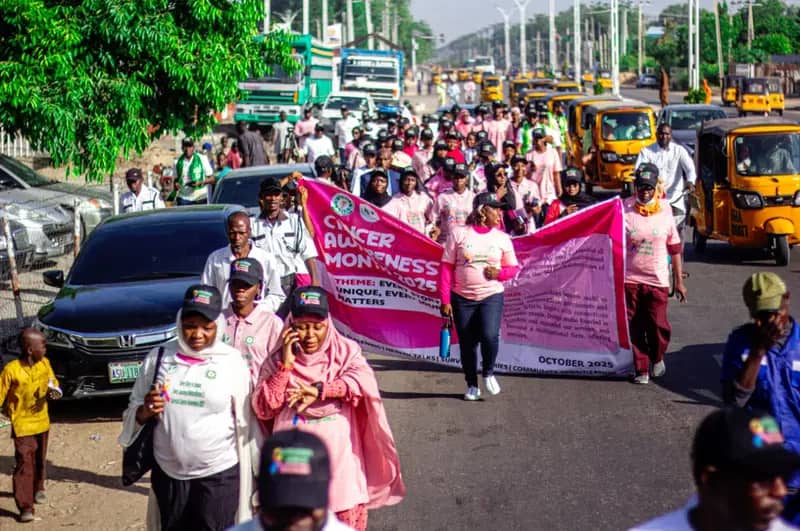
Illiyasu Abdullahi Bah
In a bold stride towards bridging the health literacy gap in Nigeria’s northeast, the Medical Women Association of Nigeria (MWAN), Borno State Chapter, in collaboration with the North East Development Commission (NEDC), launched a transformative cancer awareness campaign aimed at educating women and adolescent girls on the power of early detection.
The initiative, held on Monday to mark World Cancer Awareness Month, brought together medical professionals, development partners, and community members at the University of Maiduguri Teaching Hospital (UMTH), culminating in a symbolic road walk to the university’s main campus.
“This is not just a health talk. It’s a movement to save lives,” declared Dr. Anna Peter, President of MWAN Borno, as she addressed the gathering. She urged women to embrace breast self-examination as a routine practice, stressing that early identification of unusual lumps could mean the difference between life and death. “Timely detection allows for prompt medical care and treatment, potentially halting the development or spread of cancer,” she said.
Dr. Peter also spotlighted cervical cancer, advising women to seek medical attention for symptoms such as abnormal bleeding or blood-tinged discharge after intercourse. “These signs should never be ignored. They could be indicators of something far more serious,” she warned.
The session moved beyond theory with a hands-on demonstration by Dr. Usman Samuel Nganjuwa, a Consultant at UMTH, who meticulously taught attendees how to perform breast self-examinations in the privacy of their homes. “This simple, regular practice empowers individuals to detect abnormalities early and seek professional evaluation,” he explained.
Dr. Nganjuwa also tackled prevailing myths, revealing that breast cancer is not exclusive to women. “This year alone, I managed six male patients in this centre. Some of them have passed on, but some are still alive,” he disclosed, underscoring the need for inclusive awareness.
The campaign’s broader goal, according to another consultant present, is to reduce the incidence of late-stage breast and cervical cancers, which often lead to complex treatments and high mortality rates. “Early-stage cancers are typically more treatable, less expensive to manage, and have significantly higher survival rates,” the expert noted.
Representing the NEDC, Mohammed Umar, the State Coordinator, reaffirmed the commission’s commitment to community empowerment and humanitarian service. “We will continue to partner with healthcare professionals to sensitise the public on general health and well-being,” he pledged.
The event’s climax—a marathon road walk—served as a visual call to action, drawing attention from passersby and reinforcing the message that awareness is the first step to survival.
In a region still healing from conflict, where misinformation and cultural stigma often cloud health issues, this initiative stands out as a beacon of hope. It not only educates but empowers women to take charge of their health, shifting agency from overwhelmed healthcare systems to the individual.
Global and local oncological best practices recommend a multi-layered approach to breast cancer prevention. Experts advise women to perform breast self-exams monthly, ideally a week after menstruation, and to report any changes—such as lumps, skin dimpling, nipple retraction, or discharge to a doctor immediately. Clinical screenings and healthy lifestyles are also key pillars.
Public health advocates further urge governments and health organisations to invest in awareness campaigns, subsidise screening programmes, and ensure diagnostic and treatment facilities are accessible and affordable. Only then can awareness translate into action and action into survival.
